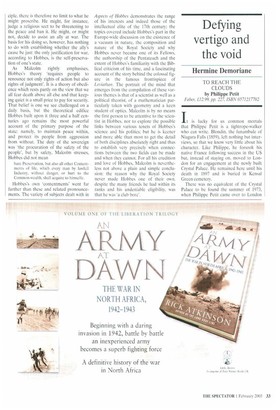The high price of civil security
Sylvana Tomaselli
ASPECTS OF HOBBES by Noel Malcolm
Clarendon, £40, pp. 656. ISBN 0199247145
Hobbes is one of the very greatest political philosophers of all times, Noel Malcolm one of his most highly esteemed contemporary interpreters. Many have written on Hobbes, but few have had the wealth and depth of historical knowledge, the linguistic and bibliographical skills and, most significantly, the philosophical rigorousness which Malcolm deploys consistently in Aspects of Hobbes, a collection of 14 impressive, and often also delightful, scholarly papers.
Hobbes's best known work Leviathan is a masterpiece of English prose. Well worth reading for that reason alone, it is especially important for those who are least inclined to agree with it. Hobbes thought that while some, indeed possibly most, individuals might well be benevolent, benevolence is not the foundation of states. Outside or prior to the advent of society men live in a state of conflict. This is so not so much because they are wicked, but because they each have a right to all things necessary to their self-preservation. The exercise of the right to self-preservation by each and everyone leads to a perpetual state of fear for all, even the strongest. It is a state of war of everyone against everyone that can only be brought to an end by men surrendering all their rights to a common authority, a sovereign.
Now, the logic by which the need for a sovereign is recognised, Malcolm underscores, also entails that that sovereign has to be absolute. He (or they, for while Hobbes thought monarchy by far the best form of government, he did not exclude the possibility of an aristocratic council or a democratic assembly constituting the sovereign) must be obeyed in all things.
The sovereign alone determines what is or is not conducive to the preservation of his people. He assesses the threats and decides how to do deal with them. In prin ciple. there is therefore no limit to what he might proscribe. He might, for instance, judge a religious sect to be threatening to the peace and ban it. He might, or might not, decide to assist an ally at war. The basis for his doing so, however, has nothing to do with establishing whether the ally's cause be just: the only justification for war, according to Hobbes, is the self-preservation of one's state, As Malcolm rightly emphasises. Hobbes's theory 'requires people to renounce not only rights of action but also rights of judgment'. It is a theory of obedience which rests partly on the view that we all fear death above all else and that keeping quiet is a small price to pay for security. That belief is one we see challenged on a daily basis, but the theoretical edifice Hobbes built upon it three and a half centuries ago remains the most powerful account of the primary purpose of the state: namely, to maintain peace within, and protect its people from aggression from without. The duty of the sovereign was 'the procuration of the safety of the people', hut by safety, Malcolm stresses, Hobbes did not mean
bare Preservation, but also all other contentments of life, which every man by lawful! Industry, without danger, or hurt to the Common-wealth, shall acquire to himselfe.
Hobbes's own 'contentments' went far further than these and related pronouncements. The variety of subjects dealt with in
Aspects of Hobbes demonstrates the range of his interests and indeed those of the intellectual elite of the 17th century; the topics covered include Hobbes's part in the Europe-wide discussion on the existence of a vacuum in nature, the composition and nature of the Royal Society and why Hobbes never became one of its Fellows, the authorship of the Pentateuch and the extent of Hobbes's familiarity with the Biblical criticism of his time, and a fascinating account of the story behind the colossal figure in the famous frontispiece of Leviathan. The portrait of the mind that emerges from the compilation of these various themes is that of a scientist as well as a political theorist, of a mathematician particularly taken with geometry and a keen student of optics. Malcolm is by no means the first person to be attentive to the scientist in Hobbes, nor to explore the possible links between various tenets of Hobbes's science and his politics; but he is keener and more able than most to get the detail of both disciplines absolutely right and thus to establish very precisely when connections between the two fields can be made and when they cannot. For all his erudition and love of Hobbes, Malcolm is nevertheless not above a plain and simple conclusion: the reason why the Royal Society never made Hobbes one of their own, despite the many friends he had within its ranks and his undeniable eligibility, was that he was 'a club bore'.



























































 Previous page
Previous page